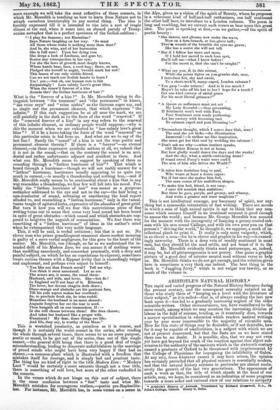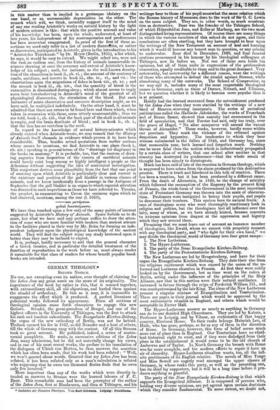ARISTOTLE'S NATURAL HISTORY.*
THE rapid and varied progress of the Natural History Sciences during the present century, and the consequent necessity entailed on all those who study them of "keeping on a level with the literature of their subject," as it is called—that is, of always reading the last new book upon it—has led to a gradually increasing neglect of the older scientific writers. Other circumstances, too, have contributed to the same result, among which we may mention the increasing division of labour in the field of science, tending, as it constantly does, towards a narrow specialization in education which renders ancient writings year by year more inaccessible to the majority of scientific men. How far this state of things may be desirable, or if not desirable, how far it may be capable of amelioration, is a subject with which we are not at present concerned, but that the facts are as we have stated there can be no doubt. It is possible, also, that we may not even yet have got beyond the reach of the reaction against that abject sub- mission to the authority of the ancients which in the sixteenth century caused a graduate of Oxford to be threatened with imprisonment by the College of Physicians for impugning the infallibility of Galen. At any rate, from whatever causes it may have arisen, the opinion has certainly prevailed that all physical science is essentially modern, and that the natural history sciences in particular are almost exclu- sively the growth of the last two generations. The appearance of such a work as that, the title of which stands at the head of our article, may, we hope, be considered as an indication of some progress towards a more sober and rational view of our relations to antiquity • Aristottes History of Anintak. Translated by Illobard Creswell, M.A., St Jobia College, Oxford. Henry G. Bolm. in this matter than is implied in a grotesque idolatry on the one hand, or an unreasonable depreciation on the other. The remark which will, we think, naturally suggest itself to the mind of any one reading Aristotle's works on natural history by the light of modern science is this: that while the positive amount and value of his knowledge has been, upon the whole, underrated, at least of late years, his independence of his contemporaries and predecessors has been somewhat exaggerated. In proof of the first of these as- sertions we need only refer to a list of modern &covet-les, or rather re-discoveries, anticipated by Aristotle, given in the introduction to his " Aristoteles Thierkunde " by Dr. Meyer (Berlin, 1855), a list which, he says, it would be easy to extend. We might select too, were not the task an endless one, from the history of animals innumerable in- stances showing at once the accuracy and extent of Aristotle's know- ledge of his subject ; such, for instance, as the well-known descrip- tion of the chameleon in book ii., ch. vi. ; the account of the anatomy of snails, ascidians, and insects in book EL, chs. iv., vi., and vii. : the observations upon the migrations of fishes in book via., ch. xv. ; and the remark in book iii., ch. xiv, that the quantity of blood in the extremities is diminished during sleep ; which almost seems to imply some faint foreshadowing in Aristotle's mind of the greatest of all physiological discoveries, the circulation of the blood. But such instances of acute observation and accurate description might, as we have said, be multiplied indefinitely. On the other hand, it must be admitted that there are errors to be found here and there which, when taken in connexion with these, seem utterly unaccountable; thus we are told, book i., oh. xiii., that the back part of the skull in all animals is empty, and the brain destitute of blood ; and in book ii., ch. i., that the lion has no vertebrze in the neck.
In regard to the knowledge of natural history-sciences which already existed when Aristotle wrote, we may remark that the History of Animals itself abounds in evidence which proves it to have been considerable. Thus, besides actual quotations from earlier authors whose names he mentions, we find Aristotle in one pima (book i., ch. xiv.) speaking in general terms of the "drawings (or diagrams) in the books on anatomy." It is probable, too, that the custom of draw- ing auguries from inspection of the viscera of sacrificial animals could barely exist long among so highly intelligent a people as the Athenians without suggesting the idea of anatomical investigation. This conjecture derives some plausibility from the fact that one point of anatomy upon which Aristotle is particularly clear and correct is the existence and position of the gall bladder in various classes of animals, and we know incidentally from a passage in the Antigone of Sophocles that the gall bladder is an organ to which especial attention was directed in such inspections as those we have referred to. Tiresias, the prophet, in enumerating to Creon the ominous signs which he bad observed, mentions, among the rest (L 1010), • -....-1CaL Fere:float xoXal Stecrweipovro.
We have thus touched upon a few only of the many points of interest suggested by Aristotle's History of Animals. Space forbids us to do more, but what we have said may perhaps suffice to draw the atten- tion of some who are more familiar with modern than ancient science to the facilities placed in their way by Mr. Bohn for forming an inde- pendent judgment upon the physiological knowledge of the ancient world. They will find the subject repay any study bestowed upon it better than they may be inclined to expect. It is, perhaps, hardly necessary to add that the general character of a Greek treatise, and in particular the detailed treatment of the function of reproduction in the work before us, must always render it unsuitable for that class of readers for whose benefit popular hand- books are intended.































 Previous page
Previous page